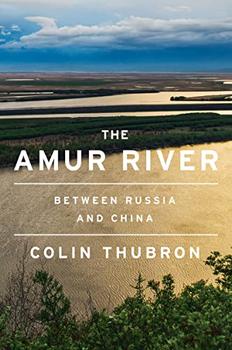Summary | Excerpt | Reviews | Beyond the Book | Readalikes | Genres & Themes | Author Bio

Between Russia and China
by Colin Thubron
Batmonkh, when I return, is surveying the leftover luggage still strapped on our tethered horses, alarmed that our food is gone and that we will have to start back at once. Tentatively, with our different hopes, we fumble open one of the mounted packs, but its stallion charges loose – they are all unnerved now – dragging its wooden saddle along the trail behind it. We can only round it up, and wait.
After an hour we hear a far-off shout. Batmonkh says: 'I think they've found it.' And soon afterwards the two men return, still inscrutable, with the lost saddlebags, as if their recovery were expected. And when we unpack that evening, on a tree-sown slope above the marshes, we find that the recovered baggage had contained our food.
We set up our tents at dusk on the rain-softened earth, the horsemen hacking down branches to frame a shelter of their own. Our possessions – food-boxes, water bottles, harness, hatchets, even a canvas chair – lie strewn about the grass, while the horses graze disburdened under the trees. It is strange, in this unpeopled solitude, to realize that our campfire is the sole human light, seen only by wolves or woken bears.
In the chill of nightfall the fire draws us closer, and its smoke repels the mosquitoes that are rising round us. Batmonkh cooks up noodles and scraps of beef on the portable stove, while the horsemen drink salted tea, and smoke. They seemed like twins at first, but now they start to diverge. Mongo looks older than he is, sashed like a brigand, hard-faced and talkative; Ganpurev keeps the appearance of a boy: but of a sharp-eyed boy who has given trouble. He is the youngest son of a family that became poor. They both wear peaked caps and high boots, and anoraks with pirated labels. Around the fire they talk about practicalities: horse-herding and money. In this terrain, eight hours' riding will cover only twenty miles, they say. Their cigarettes flare and die in the dark. Batmonkh, whose English is fluent, sometimes translates. But his world is not theirs, and he may seem as alien to them as I do. The silence, when we at last sleep, is the silence of exhaustion. Even the horses do not stir, asleep on their feet in the starlight.
*
The source of great rivers is often obscure. They descend in a confusion of tributaries, or seep from inaccessible swamps and glaciers. The Indus is born from six contested streams. The Danube, it is claimed, issues from a gutter in the Black Forest. As for the origins of the Amur, when a conclave of geographers from Russia and China met to debate it, they found to their chagrin that its farthest source lay in neither country, but in these remote Mongolian mountains. My horsemen know the river only as the Onon, the 'Holy Mother'; but if the mother herself is born somewhere, few but Ganpurev know quite where this is, and he has been there only once, ten years ago.
It is the profiles of surrounding mountains that guide us, but to me, as the sun rises, they are only snowless shadows. The morning air is cold and pure. The dew on our tent roofs has glazed to ice, and the coats of the tethered horses gleam with frost, their breath pluming over them. All morning we keep to the uplands, riding through larch forests along the tank tracks left by Soviet military exercises decades ago. The Russian border is forty miles to our north. But now the tracks have blurred to rivulets of floodwater, and shrubs and grasses closing over them. Something has happened to the larch forests too. They bank around us in folds of sombre green, but sometimes we find ourselves moving along hillsides ravaged by wildfire. The trees remain upright in death, their charred bark falling away, until our path threads between blackened gibbets. Twice, along these faded trails, we come upon tall sheafs of stacked branches, hung with votive scarves, now turned to rags, left by rangers or poachers. These ovoos mark the summit of mountain ridges that fall within the purlieus of a local spirit. Such spirits are mercurial, and sometimes angry, and here they are unknown to us. Mongo and Ganpurev dismount to circle their ovoos, and sprinkle vodka in propitiation. They ask me to copy them, for our journey's safety.
Excerpted from The Amur River by Colin Thubron. Copyright © 2021 by Colin Thubron. Excerpted by permission of Harper. All rights reserved. No part of this excerpt may be reproduced or reprinted without permission in writing from the publisher.
Your guide toexceptional books
BookBrowse seeks out and recommends the best in contemporary fiction and nonfiction—books that not only engage and entertain but also deepen our understanding of ourselves and the world around us.